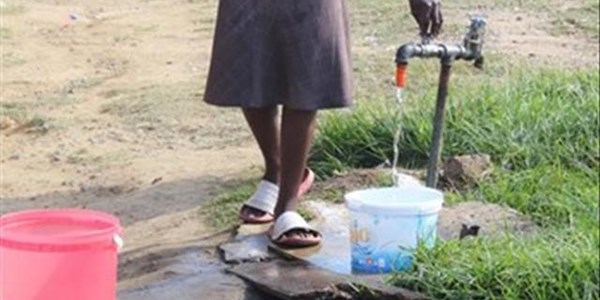Central SA
Mantsopa residents continue to battle water issues─── OLEBOGENG MOTSE 12:12 Mon, 01 Mar 2021

Residents in the Free State settlement of Thaba Phatswa are bearing the brunt of deteriorating service delivery at the financially constrained Mantsopa Local Municipality - forced to travel as far as 5 kilometres by foot to access water.
The OFM News team paid a visit to Thaba Phatswa, located 100km outside Bloemfontein, and spoke to residents Harry De Wee and Abraham Evans. They corroborated complaints from the Democratic Alliance (DA), alleging the provision of essential services not only in the small settlement, but also in nearby Tweespruit and Ladybrand, are all but non-existent. De Wee, whose home is located in an uphill part of Thaba Phatswa, shares his family’s daily water ordeal and provides some insight into what the municipality has done to remedy the now desperate situation.
De Wee says he and his family make sure to fill up their bath tub with water on the rare occasions they do get access to water, just so that they have enough to flush their toilet. He says when they take the matter up with the financially constrained municipality, they are informed that the problem lies with water infrastructure in the area, which makes it difficult for the water to be pumped uphill to parts of the settlement.
Mantsopa municipal spokesperson, Pule Lechesa, is yet to respond to media queries and phone calls on the matter. DA Councillor, Tania Halse, has pledged to provide an update from the council’s side in due course. It is expected that the state of service delivery in the province will take the centre stage in Free State Premier Sisi Ntombela's State of the Province Address (Sopa) on Tuesday 2 March.
The South African Human Rights Commission (SAHRC) recently noted that many communities in the country are battling to access water – a blatant contravention of their human rights. The SAHRC said this in a webinar hosted by the Mail and Guardian on Wednesday 17 February, outlining the contents of an investigative report into the pollution of the Vaal River. The report finds that none of the government parties, central to the saga, has taken accountability for the pollution of the river which SAHRC officials say is “beyond acceptable standards”.
Emfuleni Local Municipality, the Gauteng Department of Cooperative Governance and Traditional Affairs (Cogta) and the National Department of Water and Sanitation (DWS) have over the course of the SAHRC’s investigation – which began in 2018 – shifted the blame to other parties, including one another, for the crisis at the Vaal River.
Emfuleni says they are not the only municipality that has contributed to the crisis, a point that is noted in the SAHRC’s report. The City of Johannesburg Metropolitan Municipality, as well as the Midvaal Municipality, reportedly also directed sewage and wastewater material towards the wastewater sewerage systems situated in the Emfuleni Municipality – corroborating that these two municipalities do indeed add to the ongoing pollution.
The Department of Water and Sanitation confirms availing funds to Emfuleni to resolve the problem but say the cash-strapped municipality has squandered the funds – highlighting the mismanagement issues at the Gauteng-based municipality which have been attributed to political instability.
The panellists at the briefing – North-West University's Johann Tempelhoff; Maureen Stewart from Save the Vaal; Samson Mokoena, Coordinator at the Vaal Environmental Justice Alliance; and Shirley Mlombo from the Human Rights Commission – ultimately are in agreement that the buck stops with the Department of Water and Sanitation (DWS).
It is this national department that grants and issues municipalities with licenses to run water and wastewater service and most importantly it’s the body that enforces and must ensure adherence to the National Water Act.
Blame shifting aside, all the parties concerned have been directed to implement certain recommendations at the behest of the SAHRC to salvage the situation. These parties have been directed to respond to the SAHRC on said recommendations within a 60-day period. Here are some of the recommendations in the damning report:
The National, Provincial and Local Government must take active steps to know and understand all of its constitutional and legislative obligations and to comply and implement them as is the duty of any public servant or a municipal administrator.
The municipality must uphold the Rule of Law and Constitutional Supremacy in South Africa.
In the short term that DWS or Gauteng COGTA, together with experienced wastewater management specialists, and respective Treasury Departments must draw up a cost-effective interim plan to urgently stop or limit the flow of sewage into the streets and homes of people living in the Emfuleni area and also into the Vaal.
The National and Provincial governments, for the medium and long term, should conduct a detailed needs assessment for the clean-up and rehabilitation of the Vaal. Such an assessment should be supported by experts including financial experts, to cost and make available a project plan and budget for the implementation of such a plan on a short, medium and long term basis.
DWS must develop and implement policies and standards to deal with water crises in South Africa, and the contamination of the Vaal River in particular.
Vandalism and theft be regularly reported to the SAPS.
DWS should reintroduce the Blue and Green Drop transparent quality measuring system.
DWS must collaborate with DEFF and use the inspectors provided for in NEMA to investigate offences relating to water and sanitation, as they are likely to relate to environmental damage.
OFM News













